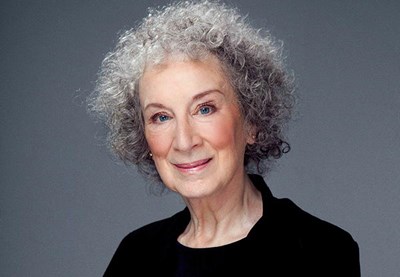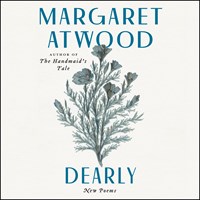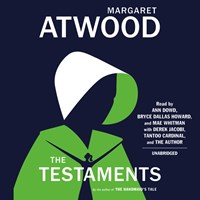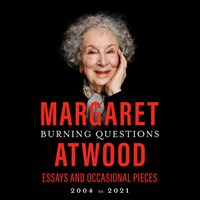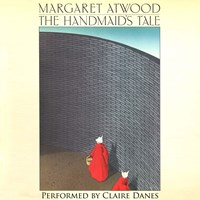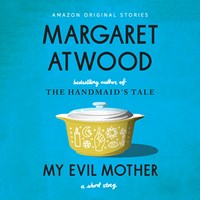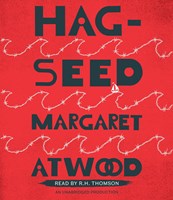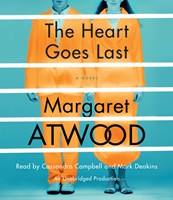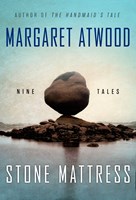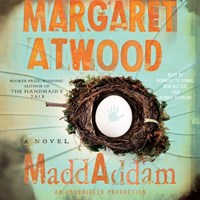Get our Newsletter
-
- Reviews
- Narrators
-
Features
- Audiobook ClubStart a conversation with your book club
- Best Audiobooks2023 Best Audiobooks
- ArticlesDiscover the diverse voices of audiobooks
- NarratorsSpotlight on popular narrators
- AuthorsAuthors talking about their audiobooks
- Upcoming TitlesFind upcoming audiobook release announcements
- Kids and TeensListening selections for kids & teens with age levels
- Audie Awards 2024 Audie Awards
- Subscribe
- About
- Articles
Talking with Margaret Atwood
Margaret Atwood—internationally acclaimed novelist, poet, winner of numerous literary awards, champion of women's rights, and passionate environmentalist—tells AudioFile, "Print is a score for voice, the way a piece of paper with music on it is a score for music. Until somebody is reading the page or playing the music, those marks just lie there. Reading the book out loud is the bridge between the oral storytelling tradition and the book in print."
Atwood finds listening to her own audiobooks "slightly creepy," but, she assures us, "I've had other people who've listened to them say they're very well done." She has helped with the selection of voices for her audiobooks, thanks to Random House audio producer Orli Moscowitz. "She sends me clips of various actors' voices for each character. Then I choose the one that sounds the most like what I think that person might sound like."
And she and her family do listen to other people's work on audio. "We listen to them in the car when we're driving. We like to listen to poetry or things that are fascinating and spritely, so we won't go to sleep." They also enjoy listening to unusual things such as BEOWULF or old radio programs. "I'm of the radio generation. I grew up listening to radio in just the way you see it in old ads and movies—with the family gathering around the radio and listening to their favorite programs."
In ORYX AND CRAKE, the first book in her recent trilogy, Atwood tells a postapocalyptic tale centered around the misuse of biotechnology and a virulent plague that destroys much of humankind. The second novel, THE YEAR OF THE FLOOD, features God's Gardeners, a group struggling for survival. "They have their own saints and feast days, and they also have their own hymns."
Atwood wrote 14 hymns to standard hymn tunes for the God's Gardeners. When musician Orville Stoeber read the manuscript, he began composing new music to the hymns. He sent them to her, and she thought they were terrific. The audiobook contains a treat that print readers miss—those hymns are brought to life with vocals and full musical accompaniment. The book launched with a combination of musical presentations and dramatic performances, which Atwood narrated. "We did that in 23 different cities in the U.S., Canada, and Japan, and we're about to do it again in France. Then we made a CD of it and made it downloadable through the Internet."
When we talked with her, Atwood was on a book tour in Minnesota, introducing her most recent release, MADDADDAM, the final book in the trilogy. When asked if she considers what she writes science fiction or speculative fiction, she answers, "Let's just toss those words out the window and think of 'with space ships' and 'without space ships'—'possible'/'not possible'—'galaxy far, far away'/'here and almost now.' The kind of book I write is the 'here and almost now' kind."
She began the trilogy because she is concerned about species extinction. "The planet is a finite size. You can't blow it up and make it bigger. And on that planet can fit only a certain amount of biomass . . . only a certain number of living creatures . . . there is a sort of outward limit to the expansion of life, and the more that is taken up by cities and buildings, the less room for biomass there is." She warns that the increase in people and the increase in energy are contributing to global warming and that we need to think about that pretty quickly. "Life will bounce back as long as we don't kill the oceans. Once we kill the oceans, we're cutting off our supply of oxygen, and that could be pretty terminal for us."
What's next for the busy author? "I'm working on three different projects, but I don't talk about them." One thing is certain—whatever Margaret Atwood is working on will always be worth the wait.--S.J. Henschel
Dec13/Jan14
© AudioFile 2013, Portland, Maine
Photo © Jean Malek
Photo by Jean Malek
The latest audiobook reviews, right in your inbox.
Get our FREE Newsletter and discover a world of audiobooks.


